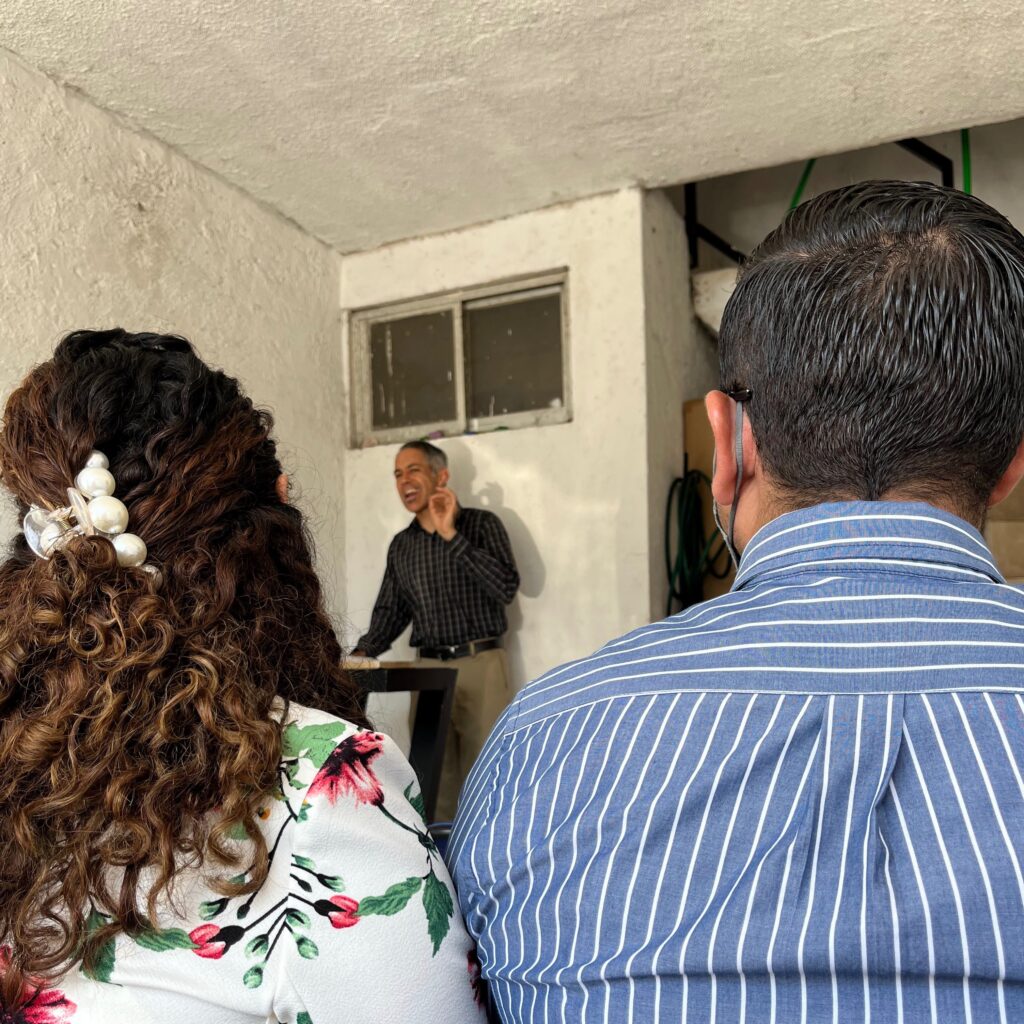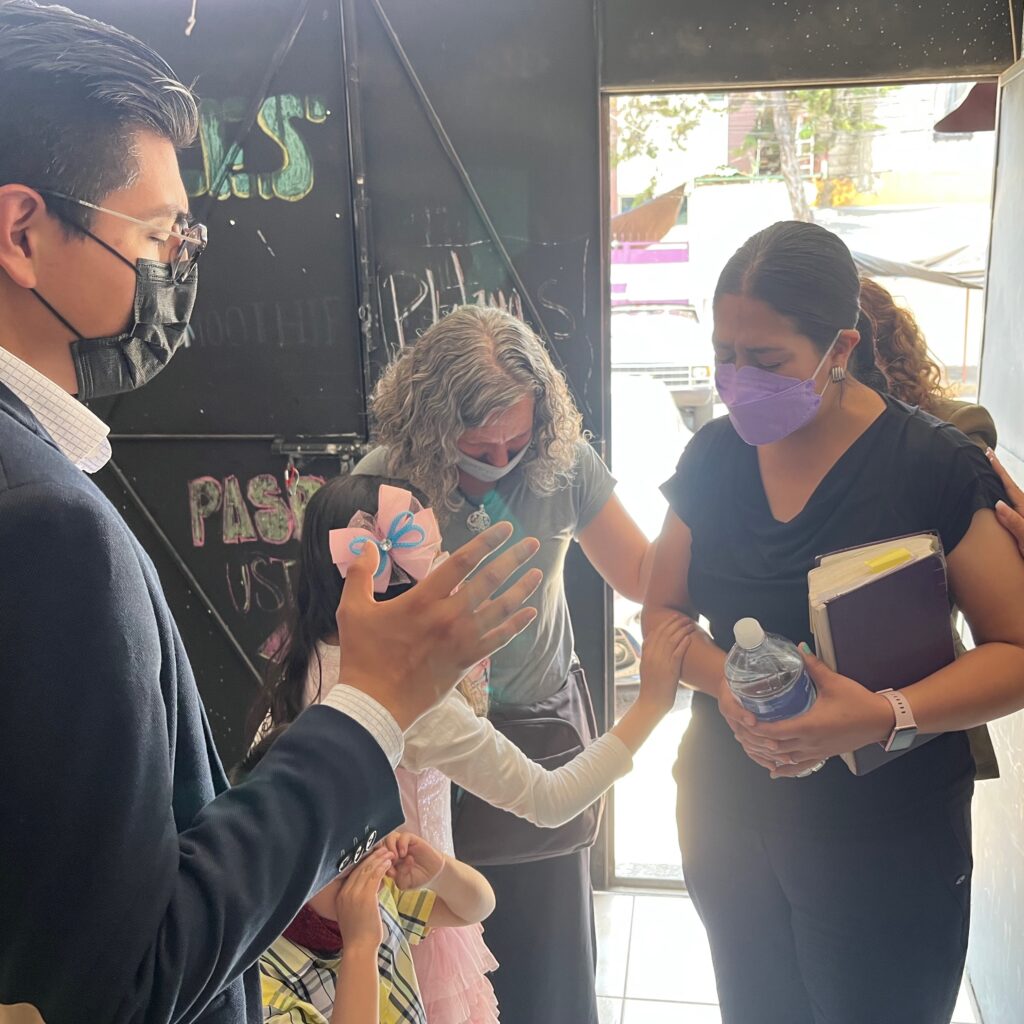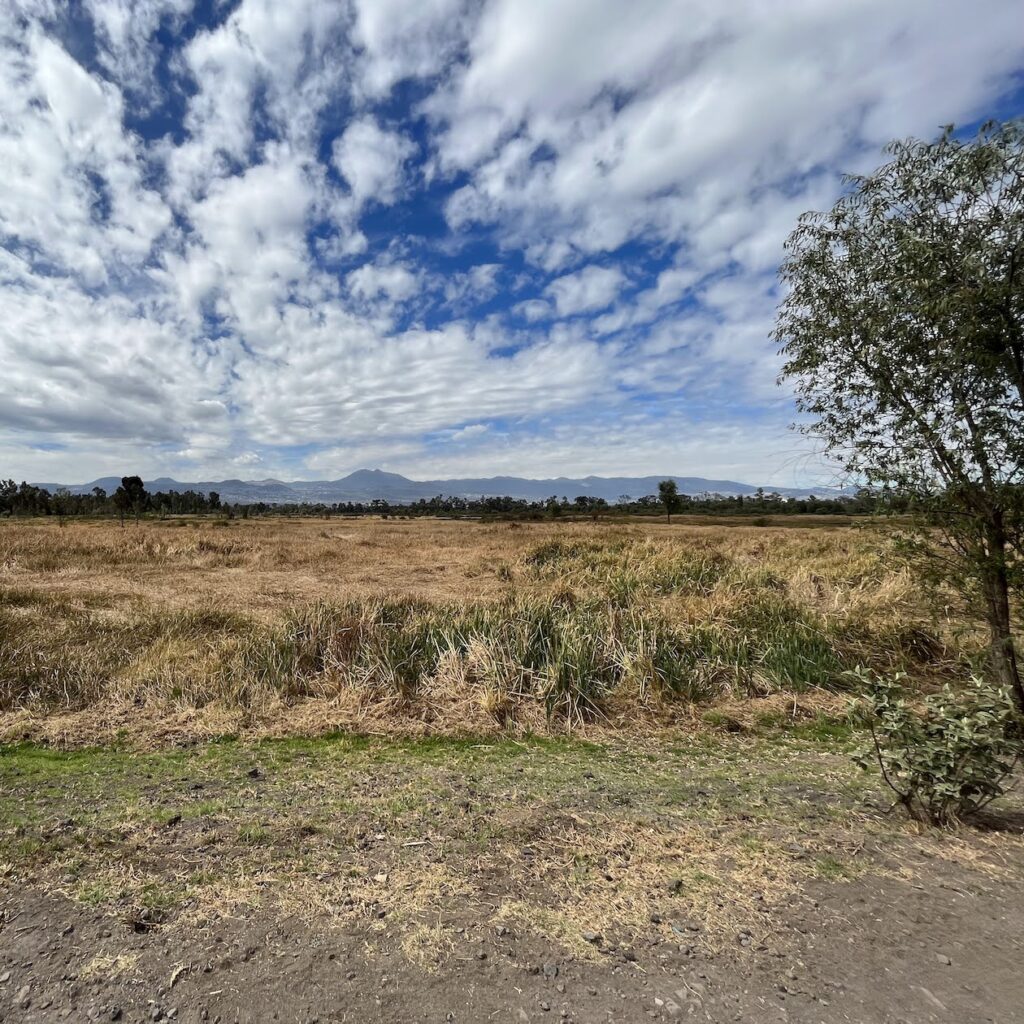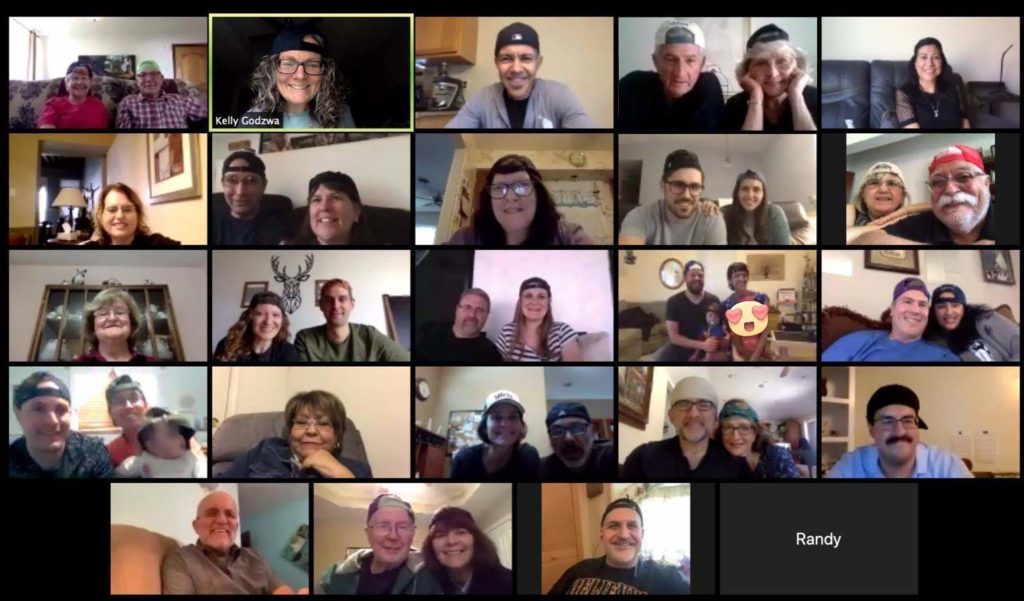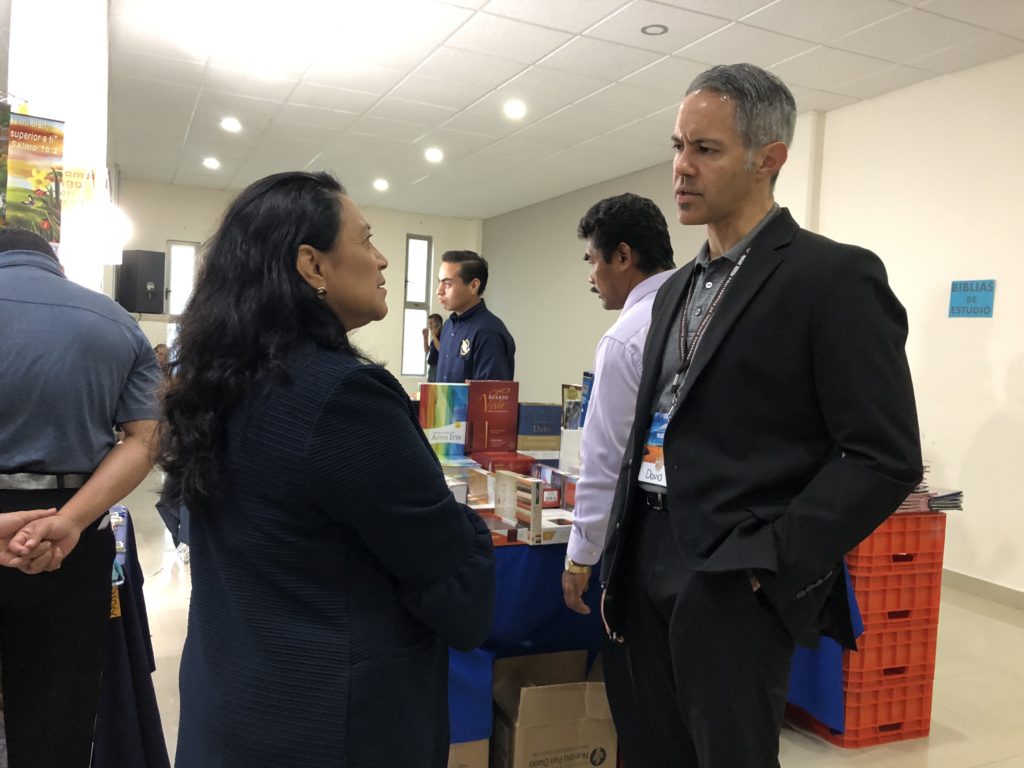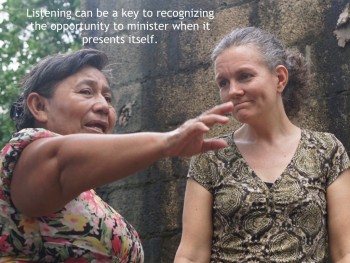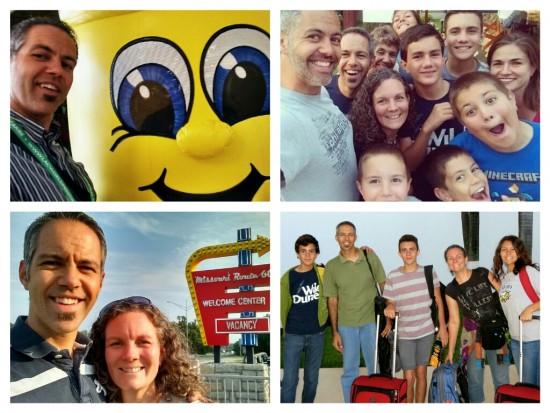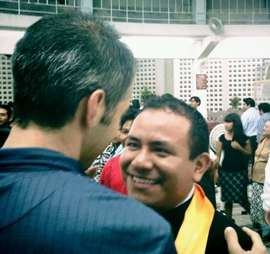Christmas is all about Christ, isn’t it? At least that was the core of the debate over the use of “Xmas,” a popular one in my childhood. Even now, with the plurality of holidays that seem to clutter the end of the year, the thoughts of many still turn to that event that split the calendar that we still use in two–the birth of Jesus.
Still, even though so many reflect on this day when God came near, it often seems so hard to enter into the spiritual interactions that we long for. With so many relatives, friends, and even strangers gathered together, the opportunities to turn the conversation to the spirit of the season, God’s activity in the here and now, seem to abound. Nevertheless, for many of us, it can be hard to move the conversation much deeper than the amount of snow that’s fallen outside.
What’s one to do? How can we interact with one another in a way that the season or any day truly deserves? How can we invite God into our conversations this Christmas?
I believe that the Bible, specifically the book of Acts, provides a template that we can use to direct our activities throughout the holidays and beyond, and it’s my prayer that this insight from Scripture will help you and your family put Christ back into Christmas, even it if be only in your circle of influence. First let’s look to the text:
Acts 8:26-401
26 As for Philip, an angel of the Lord said to him, “Go south down the desert road that runs from Jerusalem to Gaza.” 27 So he started out, and he met the treasurer of Ethiopia, a eunuch of great authority under the Kandake, the queen of Ethiopia. The eunuch had gone to Jerusalem to worship, 28 and he was now returning. Seated in his carriage, he was reading aloud from the book of the prophet Isaiah.
29 The Holy Spirit said to Philip, “Go over and walk along beside the carriage.”
30 Philip ran over and heard the man reading from the prophet Isaiah. Philip asked, “Do you understand what you are reading?”
31 The man replied, “How can I, unless someone instructs me?” And he urged Philip to come up into the carriage and sit with him.
32 The passage of Scripture he had been reading was this:
“He was led like a sheep to the slaughter.
And as a lamb is silent before the shearers,
he did not open his mouth.
33 He was humiliated and received no justice.
Who can speak of his descendants?
For his life was taken from the earth.”
34 The eunuch asked Philip, “Tell me, was the prophet talking about himself or someone else?” 35 So beginning with this same Scripture, Philip told him the Good News about Jesus.
36 As they rode along, they came to some water, and the eunuch said, “Look! There’s some water! Why can’t I be baptized?” 38 He ordered the carriage to stop, and they went down into the water, and Philip baptized him.
39 When they came up out of the water, the Spirit of the Lord snatched Philip away. The eunuch never saw him again but went on his way rejoicing. 40 Meanwhile, Philip found himself farther north at the town of Azotus. He preached the Good News there and in every town along the way until he came to Caesarea.
Now for those of you who are headed out the door to that office party or holiday potluck and are just interested in the steps to take to facilitate spiritual interaction here they are:
1. Pray for direction. (v.26, 29)
2. Obey the direction your receive. (v.27, 30)
3. Observe; hear the person’s story. (v.30)
4. Ask about their impressions, understanding, or need. (v.30)
5. Begin with the thoughts expressed. (v.35)
6. Explain God’s place in their story. (v.35)
7. Allow for the other to respond. (v.36)
For those of you with a bit more time, I offer some explanation:
The above passage is an excerpt of the account of Philip “the evangelist,” one of the seven deacons, “men full of the Holy Spirit and wisdom,” chosen in Acts chapter 6 to assist the apostles with equal food distribution among the church’s dependent widows. Prior to this passage, we see him, having fled the persecution of the church carried out by Saul of Tarsus, preaching in Samaria and carrying out a rather successful ministry. Under his work, the residents of this community received the message of Jesus, and many believed and were baptized after seeing the miraculous signs that accompanied his ministry.
Therefore, this encounter with the Ethiopian Eunuch is a bit unexpected. At the center of a successful outreach, we would expect Philip to remain in order to consolidate the work, but, apparently, God had other plans. This leads us to the first step in building bridges toward spiritual interactions:
Pray for direction: Now while it is not overtly stated how Philip received his message in verse 26 to go to the desert road, we can assume that he was at least in an attitude that facilitated spiritual direction. In my mind, that points to an active devotional life, one which enables us to hear from God and recognize his voice.
This can be a big hurdle for many of us during the holiday season. With additional tasks on our list and events to attend, it can be tempting relegate to our daily time with God to the perfunctory prayers offered up at mealtimes or perhaps during the religious events that dot our calendar, but with Philip, we see just how essential his prayer life truly was. It was the catalyst that turned his attention to an encounter that would change the life of one man and perhaps opened an entire nation to the message of the gospel.2 Our prayers, as well, may be just what we need to prepare us to cooperate with God in the life of a loved one or sensitize us to a need lying just below the surface.
But how should we pray? A retired missionary, Lloyd Marsh, offers advice on this point. During his instruction on helping others to receive the Baptism of the Holy Spirit, he would teach them to ask God, “What do you want to do?” God has a plan for the people that we meet, we should be asking Him how He would like us to cooperate with Him in fulfilling that plan.
Obey the direction you receive. Some would argue that this point is unnecessary, as one should obviously do what God tells us to do. Nevertheless, many of us could probably recall the myriad opportunities that we had allowed to slip by for fear of awkwardness or rejection. However, determining to act upon the message that we receive or the impression that we feel can help us tremendously when the event arises.
In the case of Philip, we see two occasions when he received specific direction (v.26 and v.30), and, in each case, action immediately followed. It was his obedience to the direction that he received that made the real difference in the situation.
Likewise, although we pray, unless we take action, no difference will be made. A little book, The Ten Second Rule has been helpful to both Kelly and myself as we try to overcome our natural reluctance to take the next step in obedience. The basic premise of the book revolves around this idea: “Just do the next thing you’re reasonably certain Jesus wants you to do,” and do it in ten seconds or less.
Perhaps it will be a direction to speak with that uncle you’ve always avoided or an impression to get to know that other family during the school presentation that will lead to an unexpected blessing. You never know. One thing, however, should be determined in advance: inaction isn’t an option.
Observe; hear the person’s story. This is perhaps the biggest gift that we can give this holiday season, especially when our conversations have tendency to turn into competitions instead of true giving and receiving, if this Brian Regan video is any indication. James 1:19 says it best, “Understand this, my dear brothers and sisters: You must all be quick to listen, slow to speak, and slow to get angry.”
This is precisely what we see in Philip’s encounter with the Ethiopian. Having obeyed the command to walk beside the carriage, he was able to hear that the eunuch was reading from the 53rd chapter of Isaiah, the prophecy of the “Suffering Servant,” one that Jesus fulfilled with his crucifixion and death. This observation supplied the explanation behind his unexpected direction and provided the opportunity that he needed to be able to intervene appropriately in the life of this high-ranking official.
As we spend time with others this holiday season, it could be a look or a sigh that, when noticed, might bring about an area of need where we could minister. On the other hand, a sermon or a reading from the Bible might generate an opportunity for sharing. The difference will be made when we intentionally choose to observe and develop our desire to bless others.
Ask about their impressions, understanding, or need. Sometimes, statements are made and are allowed to fall to the ground. Philip, having heard the scripture, could have walked away, satisfied that others, too, were reading the word of God. He didn’t. He asked a simple question which served to catapult the conversation into an explanation of the gospel: “Do you understand what you are reading?” (v.30)
We too can ask simple questions that may lead to deeper conversations. Questions like, “Why did you say that?” or “How did that make you feel?” may lead those around us to open up in a way that they normally wouldn’t. This is especially effective if they see that we’ve taken a genuine interest in the conversation that we’ve begun with them.
Begin with the thoughts expressed. When the opportunity does come for us to turn things to spiritual matters, a canned sermon, or a memorized script shouldn’t be our fall back. Instead, we should use Philip as our guide. He began with that same Scripture from Isaiah 53 to explain the gospel to the Ethiopian. It effectively answered the man’s question and stimulated his faith.
An admission of anxiety might allow us to share about God’s peace. An expression of loneliness might give us the opportunity to share about God sending us Immanuel “God with us” (further emphasized by our own presence with the person to whom we are ministering.) In each situation, we validate the person by hearing and responding to their situation.
Explain God’s place in their story. With Philip, the progression was natural. A scripture lead to an explanation of the ministry of the Messiah. For us, it may take a bit more thought, but the key lies in viewing our lives not as segmented compartments but as a unified whole. Once we allow God to encompass and invade every area of our own lives, connecting the current situation expressed with the activity of God in the person’s life will come more naturally.
Allow the other person to respond. Philip, after sharing his explanation, gave room for the eunuch to express his belief. His desire to be baptized signaled his acceptance of the explanation and his willingness to be initiated as a disciple of the one in whom he believed. Allowing room for others to express their reaction to our explanations may result in a request for prayer, an invite to talk further, or even, like in the case of Philip, a chance to lead someone to the Lord. The key is to make space in the conversation and to invite their response to your explanation.
Can move past superficiality this holiday season? I believe that the answer is yes, and the template that Philip models for us in Acts 8:26-40 shows us how we can. May the Lord help us to put this knowledge into action as we gather with others this Christmas and all throughout the coming year.
1 Scripture quotations are taken from the Holy Bible, New Living Translation, copyright ©1996, 2004, 2007 by Tyndale House Foundation. Used by permission of Tyndale House Publishers, Inc., Carol Stream, Illinois 60188. All rights reserved.
2Irenaeus states that the Ethiopian eunuch was “sent into the regions of Ethiopia, to preach what he had himself believed.” CHURCH FATHERS: Against Heresies, III.12 (St. Irenaeus). Ed. Kevin Knight. New Advent. Web. 8 Dec. 2015. https://www.newadvent.org/fathers/0103312.htm



